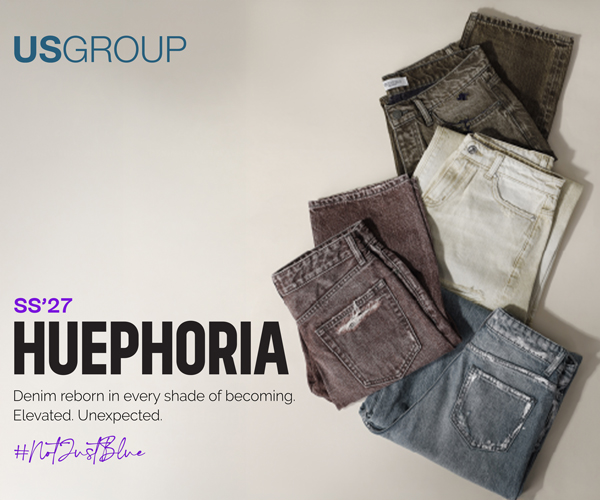Daria Martelli: Sustainability is a cultural issue

Daria fell in love with denim at an early age, has worked in the industry for many years and is currently head of men’s design for Pepe Jeans London. She believes the industry has an opportunity to learn from past mistakes and take the bold steps needed for change.
What is it about the denim industry that you love, and what inspires you?
I have always been fascinated by denim, even before I realised it. Ever since studying fashion at school, I have experimented with it. How might a pair of denim jeans look after a year of use by a carpenter rather than a painter? I tried to reproduce the effects with paint stains and wood in the school’s laboratory. I believe I still have some of the results of these experiments in some boxes.
When this passion became my work and I started getting to know the industry I understood that the world of denim lovers is a big “community”. Denim history coincides with the evolution of society, mirroring the good times and the bad. The denim industry today is committed to transforming itself, to be the pioneer of a sustainable revolution and representing the era of a positive impact within this controversial business which is fashion today.
The combination of tradition and technology, which are as perfectly combined as the warp and weft of a denim fabric, feeds my curiosity, keeping me engaged constantly and it inspires me to create the best product each time I design a new collection. I feel close to denim for its strong and unique personality, always changing itself with the purpose to create positive change.
Whose responsibility is it to communicate sustainability messages to consumers, and how do you see this developing in the future?
Lately, the word sustainability is pretty BIG, it became mainstream and as trendy as any other popular phenomenon, it created a lot of “noise” and a number of unclear messages. Sustainability though is a serious matter because it will affect the quality of our life on this planet, whether we like it or not. It is the responsibility of each of us, as human beings, to adopt sustainable habits in our own lives and at the same time to talk about it within our closer circle of influence and in wider society to awaken a consciousness as quickly as possible.
However, there are key roles such as those who work on the fashion industry’s main stage, like brands and testimonials (influencers, showbusiness people, etc) who, thanks to their social media’s power, can reach a big audience in a quick and decisive way.
My strong belief though is that the final and best result in terms of sustainable consumers’ habit shifts will be achieved when we transform the culture of people. Being sustainable is not a marketing campaign, it is a cultural issue.
For the near future I think that there will be those who will try to carry on doing things in the “old and dirty” way, but this is a short-term strategy which will not reward companies in the future.
In time, and thanks to an awakening consciousness, the demand from consumers for a more sustainable industry will force even the most reluctant companies to make the transition to cleaner production. This is a process which will affect the whole industry – not just fashion.
The recent events of the covid-19 pandemic have affected many companies, whether they are brands or part of the supply chain. For some of them, the investment in sustainable transformation has been postponed in favour of other priorities. For others, this crisis has been the impetus to accelerate their sustainable transformation.
How has the pandemic affected the industry?
Covid-19 has affected every aspect of our lives. The last few months have been tough, everyone had to reorganise and reinvent how to get work done. As travelling was impossible we discovered we can make things in a different way, we learned how to communicate efficiently and remotely, we developed greater trust in our colleagues as on several occasions we could not review the garment’s development ourselves. We shared a lot of our professional knowledge to help others to take decisions on our behalf. We have been more focused on the products we thought we needed, avoiding wasting time and resources.
As result of what I hope is the final stage of this worldwide pandemic, I think we have learned some important lessons. They are fundamental knowledge which will help us to do things better and to elevate our development and production’s process to a higher level of efficiency and value.
What is the key to working with suppliers?
The success of a product is, without doubt, the result of a strong team’s collaboration. Any business’s relationship is a complex combination of “ingredients”, finding the perfect recipe is not easy and it requires a lot of time. When I am able to build trust, collaboration and respect, I achieve a better result.
Suppliers are a precious resource of knowledge and newness to me. They are often my first source to discover new washes, techniques and shapes even before I visit trade fairs or do my own research. I rely on their know-how and when I start working with a new supplier, I am always happy to visit their factories and meet them in person; this is key to building strong bases which result in strong collaborations. The criteria of selection of our suppliers is based on a company’s strategy whose purpose is to find the best balance of quality and price.
Is there anything you’d like to see change in the industry?
There are quite few things I would love to see change in the fashion industry. One is strictly related to the fashion business and this is the need to reconsider the timings dictated by the official fashion calendar, which created the need for so much new product in store that we ended up having cashmere coats in July and sleeveless dresses in January. Thankfully, the pandemic highlighted this issue and quite a few brands, some of them quite popular, made public their concern about it and their intention to present collections based more on consumers’ needs.
Another very important issue to me, something to which I am committed personally, is to rebalance the relationship of people with their wardrobe and the value they give to their purchases. We need people to care about what and who is behind any product they buy, and this is the most powerful weapon we have to redirect this dangerous system of consumption towards a positive and necessary change for the planet and humanity.












